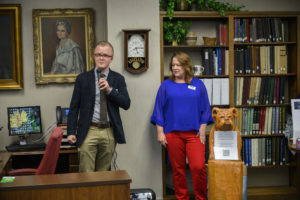NEWS
Public history interns get help making history
Monday was National Library Day, the equivalent of Super Bowl Sunday for folks like Nolan Eller, Louisiana Tech’s Archivist and Special Collections chief who deserves a standing ovation for his work as an internship supervisor during the Covid-19 challenges of this spring quarter.
“He’s taken the students’ public history internships online,” said Dr. V. Elaine Thompson, Department of History Coordinator, “and yet the students are still actively engaging in activities that help the archives to meet their stated goals.”

University Archivist Nolan Eller welcomes guests to an event marking the 125th Anniversary Collection at the Archives.
History majors and archive interns Ashlie Ellis and Caiyen Torres began the first week of the quarter March 11 with Eller in Prescott Memorial Library where they got hands-on experience working with physical materials and processing a collection.
But by March 16, the University had transitioned to online classes. One week later came the gubernatorial order to teach and learn from home.
Suddenly for both Ellis and Torres — and Eller too — the archiving business was not the same old thing.
“The transition to online classes has been a lot,” Ellis said, “but it’s been relatively easy for the internship, and Mr. Eller always makes sure we are doing well with the course work and makes sure we know we can ask him any questions we have.”
“Although it is not the internship I had planned on, I am very appreciative and grateful that Mr. Eller has still been able to make sure we’re getting a quality experience,” said Torres, who plans to graduate in the summer, then attend graduate school to focus on another aspect of public history, the National Park Service.
Ellis is scheduled to graduate this spring and hopes to work in the history field preserving artifacts.
In a normal quarter, Eller introduces interns to processing and cataloging collections, finding aids, assisting patrons, and developing exhibits. It’s about the same thing now, except he’s figured out a way to make much of that happen at a distance.
“Luckily, like many professions, the archival profession has been trending towards more digital initiatives and digital platforms, so the transition was much easier to do than one might expect,” Eller said. “Even though we all miss meeting face-to-face and physically working with materials, this internship in the current environment will give our students a head start in the archives and museum professions. They will have hands-on experience working with digital materials and creating digital projects.”
The two biggest project opportunities for the interns pre-pandemic were to process an archival collection and to curate an exhibit utilizing materials from our collections.
“During the current climate we had to switch gears a little bit,” Eller said, “but our students will still be able to accomplish both of those tasks.”
When the stay-at-home order went into place, Eller scanned and sent to both interns all of the materials they would need to finish processing their collections from home. They were able to finish the arrangement of their collections and create a finding aid for their collections too.
In regards to the exhibit component of the internship, the students will still be curating an exhibit, “but they’ll be doing it online, utilizing materials that we have previously scanned, then mounting them on Louisiana Tech’s Digital Commons page,” Eller said. “The exhibits the students will be curating will feature materials unique to Tech’s University Archives and Special Collections. Because of the Digital Commons platform, our students will be able to do all of this from their home computers, and because of Zoom and Mediasite, I’ll be able to instruct them in regards to the intricacies of our Digital Commons page.”
In addition to those projects, the interns will be interviewing archivists currently working in the field in Louisiana; Ellis interviewed Centenary College archivist Chris Brown on Zoom in mid-April.
They’ve also been assigned some reading about the profession and archival theory, will investigate what employers in the field of public history are looking for in candidates for positions by looking at current job postings, and will assist University Archives and Special Collections in building up its social media presence, something Torres hopes pays dividends because of the value of all that’s available on Prescott’s fourth floor.
“The archives are an amazing asset to the University as well as to Lincoln Parish and the surrounding area,” Torres said. “It provides the public with so many valuable source materials.”
It hasn’t been perfect. Processing a collection is very complex, and for a collection to be processed correctly, the processor needs to have complete knowledge of the collection because “the way they describe and organize the collection,” Eller said, “is the way it will utilized by researchers and patrons far into the future; this unfortunately is difficult to do from their living rooms.”
Also in a non-quarantine world, interns would be assisting patrons, cleaning, re-processing collections, assisting with re-organization projects, and other tasks required for daily operations. Still, the trio has soldiered on fine, just not by the book.
“It’s really interesting to get to know another archivist day to day as well as learn what it took for them to become an archivist,” Ellis said. “I enjoy the internship and the effort Mr. Eller puts into it so that we can get the most out of it and find something we enjoy.”
“We’re having regular meetings to discuss what they’ve learned, challenges they’re having, and more,” Eller said. “The pandemic has forced us to think about things differently and to think outside the box. While my interns are not getting ‘hands-on experience’ working with physical materials, they are getting a hand- on experience in regards to where the profession is going in the future.”